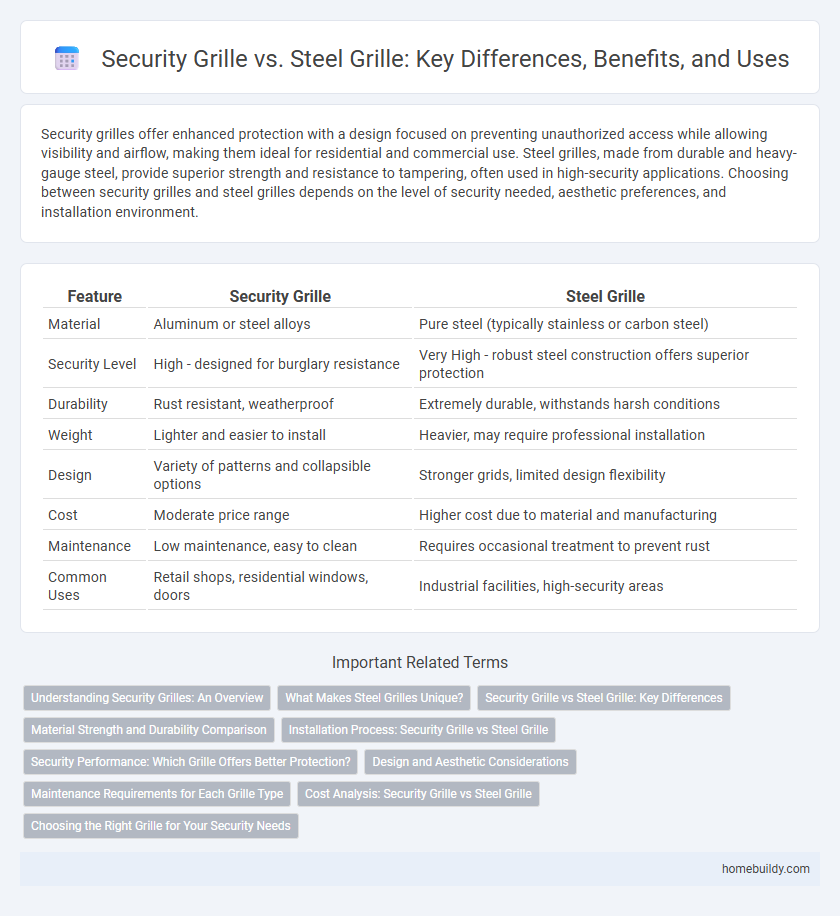Security grilles offer enhanced protection with a design focused on preventing unauthorized access while allowing visibility and airflow, making them ideal for residential and commercial use. Steel grilles, made from durable and heavy-gauge steel, provide superior strength and resistance to tampering, often used in high-security applications. Choosing between security grilles and steel grilles depends on the level of security needed, aesthetic preferences, and installation environment.
Table of Comparison
| Feature | Security Grille | Steel Grille |
|---|---|---|
| Material | Aluminum or steel alloys | Pure steel (typically stainless or carbon steel) |
| Security Level | High - designed for burglary resistance | Very High - robust steel construction offers superior protection |
| Durability | Rust resistant, weatherproof | Extremely durable, withstands harsh conditions |
| Weight | Lighter and easier to install | Heavier, may require professional installation |
| Design | Variety of patterns and collapsible options | Stronger grids, limited design flexibility |
| Cost | Moderate price range | Higher cost due to material and manufacturing |
| Maintenance | Low maintenance, easy to clean | Requires occasional treatment to prevent rust |
| Common Uses | Retail shops, residential windows, doors | Industrial facilities, high-security areas |
Understanding Security Grilles: An Overview
Security grilles offer effective physical barriers that enhance protection for windows, doors, and storefronts by preventing unauthorized access while allowing visibility and ventilation. Unlike steel grilles, which prioritize maximum strength through heavy gauge steel bars, security grilles balance security with aesthetic appeal by utilizing customizable designs and materials such as aluminum or stainless steel. Choosing the right security grille involves considering factors like installation environment, durability, maintenance requirements, and compliance with local safety standards.
What Makes Steel Grilles Unique?
Steel grilles stand out due to their superior strength and durability, offering enhanced security compared to standard security grilles made from lighter materials like aluminum or iron. Their robust construction resists cutting, bending, and forced entry, making them ideal for high-risk environments such as commercial properties and secure facilities. Steel's corrosion-resistant treatments and customizable designs also provide long-lasting protection without compromising aesthetic appeal.
Security Grille vs Steel Grille: Key Differences
Security grilles are typically designed with a focus on visibility, ventilation, and aesthetic integration, often made from lightweight aluminum or stainless steel alloys, whereas steel grilles emphasize maximum strength and durability due to their heavier gauge steel construction. Security grilles offer enhanced customization options and corrosion resistance, suitable for residential and commercial applications prioritizing both security and appearance. In contrast, steel grilles are preferred in industrial settings requiring robust protection against forced entry and environmental damage.
Material Strength and Durability Comparison
Security grilles offer enhanced material strength with reinforced steel composition designed to withstand impact and tampering, while traditional steel grilles may use thinner gauge steel that compromises durability under force. The robust construction of security grilles provides superior resistance to corrosion and environmental wear, extending service life in harsh conditions compared to standard steel grilles. Material treatments such as powder coating or galvanization further improve the durability of security grilles, making them a more reliable choice for long-term security applications.
Installation Process: Security Grille vs Steel Grille
The installation process of a security grille typically involves mounting a pre-fabricated frame with integrated locking mechanisms, which allows for quicker setup and easier customization to fit various door or window sizes. In contrast, steel grilles often require more extensive fabrication on site, including cutting and welding steel bars to precise dimensions, making the installation more labor-intensive and time-consuming. Both options demand professional expertise for secure anchoring, but security grilles generally offer a more streamlined installation conducive to residential or commercial retrofit projects.
Security Performance: Which Grille Offers Better Protection?
Security grilles and steel grilles both provide effective barriers, but steel grilles offer superior security due to their enhanced strength and resistance to forced entry. Steel grilles utilize heavy-gauge steel bars and welded joints that withstand cutting, prying, and impact attacks more effectively than standard security grilles made from lighter materials. The higher tensile strength and durability of steel grilles make them the preferred choice for maximum protection in high-risk environments.
Design and Aesthetic Considerations
Security grilles offer a versatile range of design options with customizable patterns and finishes, enhancing aesthetic appeal without compromising protection. Steel grilles provide a more industrial look, emphasizing durability and strength but often limiting decorative flexibility. Choosing between security and steel grilles depends on balancing design preferences with the desired level of visual integration and security.
Maintenance Requirements for Each Grille Type
Security grilles typically require minimal maintenance, involving periodic cleaning and lubrication to ensure smooth operation and prevent rust. Steel grilles demand more intensive upkeep due to their susceptibility to corrosion, requiring regular anti-rust treatments, repainting, and inspection for structural integrity. Choosing between security and steel grilles depends on balancing maintenance effort with durability and environmental exposure.
Cost Analysis: Security Grille vs Steel Grille
Security grilles typically offer a lower initial investment compared to steel grilles due to their lighter materials and simpler manufacturing processes. Steel grilles, while more expensive upfront, provide enhanced durability and require less frequent maintenance, resulting in cost savings over time. Evaluating total cost of ownership, including installation, maintenance, and lifespan, is essential for an accurate comparison between security grilles and steel grilles.
Choosing the Right Grille for Your Security Needs
Security grilles offer versatile protection with options like aluminum and mesh designs suited for residential and commercial use, while steel grilles provide superior strength and resistance against forced entry, ideal for high-risk environments. When choosing the right grille for your security needs, consider factors such as material durability, installation requirements, visibility, and aesthetic preferences alongside the level of threat. Prioritizing steel grilles ensures maximum security in areas requiring stringent protection, whereas security grilles balance safety and airflow for moderate-security applications.
Security grille vs Steel grille Infographic

 homebuildy.com
homebuildy.com